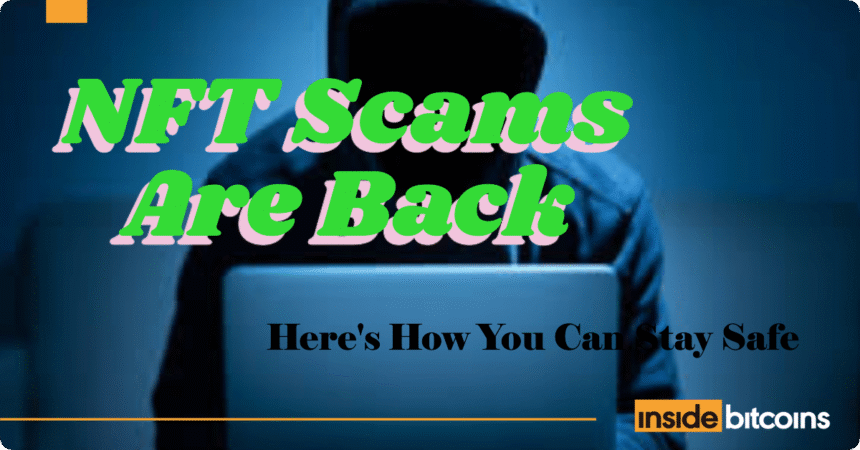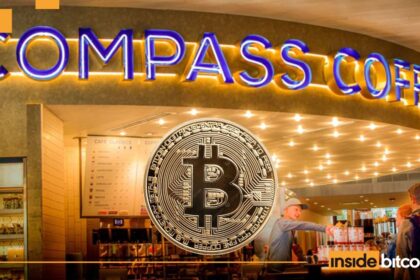Join Our Telegram channel to stay up to date on breaking news coverage
Non-fungible tokens are back in business, and trading is picking up. In recent weeks, the global non-fungible token market has seen unprecedented growth, marked by a significant increase in trading sales volume and floor price values. Nonetheless, the recent market resurgence has also led to a rise in scams and other fraudulent activities. In this article, we will assess some of the tricks scammers often use and how to navigate them.
NFT Scams Are Back – Stay Safe
The global non-fungible token market shows signs of life again in July after months of declining activity. During such a time, most collectors are buying NFTs on marketplaces like Magic Eden, Blur, and OpenSea, but sometimes they pursue “over-the-counter” (OTC) deals where two NFT traders set up a unique price or swap. The OTC trading is one of the most adopted NFT trading because it helps collectors get the exact NFT they want, since they can negotiate with the owner of a specific NFT rather than buying something on the “floor” of a marketplace.
Nonetheless, there’s a big problem with OTC trades that makes them one of the most dangerous things traders can do in NFTs. Since the OTC markets are generally subject to less stringent regulations compared to exchanges, they become more susceptible to manipulation and fraud. In most cases, scammers love to steal NFTs by tricking the owner during the process of OTC trade.
OTC NFT trading, which involves direct NFT transactions between parties outside of a public exchange, can be somewhat safe if conducted through reputable platforms and with appropriate precautions. However, it also carries risks like counterparty risk, potential for scams, and lack of transparency compared to trading on an exchange. Since 2021, most NFT investors have suffered huge losses in millions of dollars of NFTs through fake OTC trades. In 2025, the same NFT scams are returning to prominence.
How OTC NFT Scams Occur?
Since many NFT marketplaces don’t facilitate OTC trading. These trades use “private listing” features where a wallet lists an NFT at a specific price to a different wallet. Only the specified wallet is allowed to make the purchase. This is a great tool for when someone says they’re willing to pay a certain amount for an NFT – you can just create a private listing and make them buy it!
Interestingly, many OTC tools are increasingly focused on ensuring that the parties negotiating can do so in a secure way, such as by proposing a trade on-chain and the platform notifying the recipient. However, many OTC deals are negotiated privately in direct messages or trading channels in a Discord server and on Telegram. This private negotiation is how most OTC scams have been occurring in recent days. So, let’s discuss how OTC scams really happen.
There are several ways that NFT traders can be scammed through over-the-counter trades. One of the most common OTC scams today is really a phishing technique. In this trick, scammers create legitimate-looking accounts to infiltrate NFT communities here on X and other platforms. They’ll often gain legitimate followers from these communities, and that gives them credibility when they start messaging NFT holders about potential NFT trades.
Scammers would start by sending DMs to holders of the community they noted expressing some interest in buying their NFT. They will often negotiate slowly and deliberately to make the seller feel safe and reduce “red flags.” They’ll often make offers that are just above the floor price of an NFT, but not so high that it seems too good to be true. In most cases, they offer deals with more flexibility in payment.
Finally, scammers would send victims a link to either an OTC NFT marketplace or an NFT trading marketplace where they claim to have sent them an “offer.” In most cases, the scammers could also direct traders to a “new” OTC marketplace that they favor. They often use an excuse like “I want to farm X2Y2 for points” or “OpenSea isn’t working for me” to force you to their preferred site. Once trader click their links, they end up drained.
Here’s How You Can Stay Safe!
Following some simple rules will help you navigate these trades and avoid scams. If someone in a DM says they’ve sent you a trade, you can confirm if it’s true by logging in to the NFT website directly and validating that your counterparty actually owns what they say they do. Moreover, use the OTC tool to ensure they are truly proposing to send you the NFT or crypto you want, instead of a knock-off version or a “right-click saved” jpeg.
NFT traders are also advised to use a specific wallet for selling and trading. In most cases, OTC deals will require smart contract approvals. In that context, keeping only the assets that you plan to sell in the wallet you’re trading with will eliminate risk to the rest of your NFTs if you own several NFTs from a single collection. Moreover, if your counterparty is pressuring you to use a platform you’ve never heard of or if they claim to be having issues with well-known tools, RUN AWAY!
Related NFT News:
Best Wallet – Diversify Your Crypto Portfolio
- Easy to Use, Feature-Driven Crypto Wallet
- Get Early Access to Upcoming Token ICOs
- Multi-Chain, Multi-Wallet, Non-Custodial
- Now On App Store, Google Play
- Stake To Earn Native Token $BEST
- 250,000+ Monthly Active Users
Join Our Telegram channel to stay up to date on breaking news coverage










